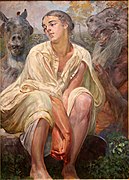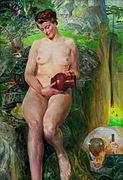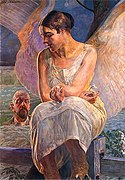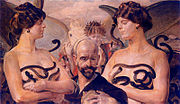Maria Bal
Maria Bal | |
|---|---|
 Bacchante, portrait of Maria Balowa by Jacek Malczewski, 1907 | |
| Born | Maria Brunicka 26 July 1879 |
| Died | 1 January 1955 (aged 75) |
| Known for | Painting |
| Movement | Symbolism |
| Spouse | Stanisław Bal |
Jadwiga Maria Kinga Bal (Balowa) of Zaleszczyki, née Brunicka (26 July 1879 – 1 January 1955) was a Polish baroness and a lifelong muse of Jacek Malczewski, considered Poland's national painter. She served as the live model for a series of his symbolic portrayals of women, as well as nude studies and mythological beings. Most were completed before the interwar period when Poland had not yet achieved independence.[1][2]
Early life and education[edit]
Jadwiga Maria Brunicka (called Maria) was born during the foreign Partitions of Lithuania-Poland to baron Seweryn Brunicki, a Polish land-owner, and his wife Jadwiga Maria Kryspina Zagórska, (see the Ostoja coat of arms) at their country estate in Zaleszczyki (now Zalischyky, western Ukraine).[3] A descendant of a Jewish family from Bavaria, her father carried the title of baron received in 1813.[4] The family owned a tenement house in the metropolitan city of Kraków at ul. Pierackiego 7, where Maria later was a frequent visitor.[4]
Maria was noted as being exceptionally beautiful by her family. They called her Kinga from the time she was a girl. As was typical of wealthy families, she was educated at home by a tutor.[4]
Marriage and family[edit]
In 1898 Maria Brunicka married Stanisław Jakub Bal, a land-owner who was nine years older. The main residence of the Bal family was an estate in Tuligłowy, in eastern Poland. The house had been rebuilt in the early 19th century. They had two daughters together.[4] Their marriage ended about 1904.[5] One of their daughters, Helena Bal (1904–1996), became a painter in the interwar period.[6]
From about 1904 to the outbreak of World War I, Maria had an affair with the painter Jacek Malczewski who was 25 years her senior; elected Rector of the Academy of Fine Arts in 1912.[7][8] They remained friends after she broke up with him, and frequently corresponded during her foreign travels.[4] In 1923 she married again, this time to a Jerzy Turno, (see the Kotwica coat of arms).[4][9] Malczewski was among the prominent guests at her wedding.[4]
Muse and model[edit]
Maria Bal had met the artist Jacek Malczewski around 1904 while living in Kraków, after her first marriage had come to an end. They had a tumultuous affair that lasted until World War I.[4] She posed for many of his symbolic paintings from the Pythia series painted at the cusp of Poland's return to independence (before the end of the war).[5] These works included his numerous self-portraits with muses.[10] Malczewski was a married man. He had a son, Rafał born in 1892, who also became a painter later on.[11]
Maria Bal was a star of the local literary society in Kraków. She was also a regular at the gatherings of artists held at the Kraków mansion of Olga Chwistkowa. After breaking up with Malczewski, Maria remained friends with him. They frequently corresponded before her second marriage.[4]
Maria is one of the most revered art models in Poland.[6] She died on 3 January 1955 in Kraków at the age of 75.[4] A black dress of hers, from the 1930s, is on display at the Department of Fashion in the Central Museum of Textiles in Łódź.[12]
Selected depictions of Maria by Malczewski[edit]
-
Enslavement
-
At the Source
-
Intermezzo
-
Angel of Death
-
Motherland
-
Sleeping Harpy
-
Finis Poloniae (double portrait)
-
The Spring
Notes and references[edit]
- ^ Elzbieta Charazinska, director; Musée d'Orsay (2006). "Jacek Malczewski (1854-1929)". Exhibitions. Musée d'Orsay. pp. 2 of 3. Retrieved November 12, 2012.
In the background of his models he gave shape to symbols with esoteric meanings supposed to provide keys for a psychic interpretation. Similarly, he depicted mythological and fantastical beings, which seem to be almost tamed, in landscapes that hint at links both to his childhood and maturity.
- ^ Rachel Le Goff (15 February – 14 May 2000). "Is Malczewski the most conceited artist ever?". The Arts with Rachel Le Goff. Electronic Publishing Co. Archived from the original on April 17, 2013. Retrieved November 12, 2012.
- ^ M.J. Minakowski (2012). "Jadwiga Maria Kinga bar. Brunicka z Zaleszczyk h. wł". Potomek uczestnika Sejmu Wielkiego (in Polish). Genealogia potomków Sejmu Wielkiego. Retrieved November 7, 2012.
Tomasz Lenczewski, Genealogia rodów utytułowanych - ut.21.1.148
- ^ a b c d e f g h i j Łukasz Bajda. "Muza Jacka Malczewskiego i jej córki". Balowie i artyści w I połowie XX wieku. Wydawnictwo Libra. pp. 123–134. Retrieved November 7, 2012.
- ^ a b Monika Majewska (2012). ""Pytia" by Jacek Malczewski, 1917" (Dokumenty). Zbiory Muzeum Narodowego w Kielcach (1945). Chomikuj.pl.
Obrazy z cyklu Polonia (Paintings of the Polonia series from the collections of the National Museum in Kielce).
- ^ a b Włodzimierz Kalicki (September 14, 2012). "Malczewski u źródła". Ale historia (in Polish). Gazeta Wyborcza. Retrieved November 7, 2012.
- ^ PAP (Polish Press Agency) (September 4, 2012). "Biografia Jacka Malczewskiego". Malczewski. Dukt pisma i pędzla (in Polish). Onet.Kultura. Archived from the original on April 16, 2013. Retrieved November 16, 2012.
- ^ "Jacek Malczewski (Radom 1854 - Kraków 1929)". Short biography (in Polish). Pinakoteka Zascianek.pl. Retrieved October 18, 2012.
Encyklopedia Powszechna PWN, Warsaw 1974.
- ^ M.J. Minakowski (2012). "Jerzy Turno h. wł. (Kotwice) (ID: cz.I040843)". Genealogia potomków Sejmu Wielkiego. Retrieved November 7, 2012.
- ^ Maria Hussakowska (2000). "Images of Women In Turn-of-the-Century Polish Painting". Presentation, Polish Arts Club of Buffalo on March, 1996. Polish Academic Information Center, University at Buffalo. Archived from the original on February 21, 2012. Retrieved November 8, 2012.
- ^ PAP (August 12, 2011). "Obrazy Malczewskich na wystawie w Zakopanem". Wiadomości (in Polish). Gazeta.pl. Archived from the original on March 2, 2014. Retrieved October 19, 2012.
- ^ Aleksandra Trella; Senior Curator (2012). "Polish national costume". Department of Fashion. Łódź: Central Museum of Textiles (Muzeum włókiennictwa). Retrieved November 7, 2012.









